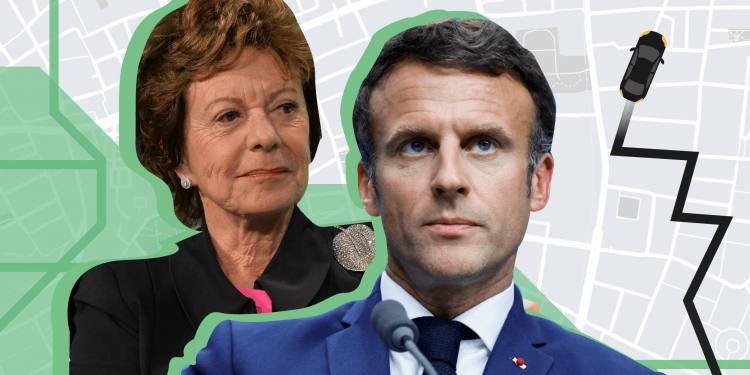Thousands of leaked files have exposed how Uber courted top politicians, and how far it went to avoid justice. They detail the extensive help Uber got from leaders such as Emmanuel Macron and ex-EU commissioner Neelie Kroes. They also show how the taxi firm’s former boss personally ordered the use of a “kill switch” to prevent raiding police from accessing computers.
Uber says its “past behaviour wasn’t in line with present values” and it is a “different company” today. The Uber Files are a trove of more than 124,000 records, including 83,000 emails and 1,000 other files involving conversations, spanning 2013 to 2017. They were leaked to the Guardian, and shared with the International Consortium of Investigative Journalists and a number of media organisations including BBC Panorama. They reveal, for the first time, how a $90m-a-year lobbying and public relations effort recruited friendly politicians to help in its campaign to disrupt Europe’s taxi industry.
While French taxi drivers staged sometimes violent protests in the streets against Uber, Mr Macron – now president – was on first name terms with Uber’s controversial boss Travis Kalanick, and told him he would reform laws in the firm’s favour.Uber’s ruthless business methods were widely known, but for the first time the files give a unique inside view of the lengths it went to in achieving its goals.
They show how ex-EU digital commissioner Neelie Kroes, one of Brussels’ top officials, was in talks to join Uber before her term ended – and then secretly lobbied for the firm, in potential breach of EU ethics rules. At the time, Uber was not just one of the world’s fastest-growing companies – it was one of the most controversial, dogged by court cases, allegations of sexual harassment, and data breach scandals.
Eventually shareholders had enough, and Travis Kalanick was forced out in 2017. Uber says his replacement, Dara Khosrowshahi, was “tasked with transforming every aspect of how Uber operates” and has “installed the rigorous controls and compliance necessary to operate as a public company”.
‘Spectacular’ Macron help
Paris was the scene of Uber’s first European launch, and it met stiff resistance from the taxi industry, culminating in violent protests in the streets. In August 2014, an ambitious former banker named Emmanuel Macron had just been appointed minister for the economy. He saw Uber as a source of growth and badly needed new jobs, and was keen to help.
That October, he held a meeting with Mr Kalanick and other executives and lobbyists, which marked the start of a long – but little-publicised – stint as a champion of the controversial firm’s interests within government. Uber lobbyist Mark MacGann described the meeting as “spectacular. Like I’ve never seen,” the files show. “We will dance soon,” he added.
“Emmanuel” and “Travis” were soon on first name terms, and met at least four times, the files show – in Paris, and at the World Economic Forum conference in Davos, Switzerland. Only the Davos meeting has been previously reported. At one point Uber wrote to Mr Macron saying it was “extremely grateful”. “The openness and welcome we receive is unusual in government-industry relations.”
French taxi drivers were particularly enraged by the 2014 launch of UberPop – a service which allowed unlicensed drivers to offer rides, at much lower prices. Courts and parliament banned it, but Uber kept the service running as it challenged the law.
Mr Macron didn’t think there was a future for UberPop, but he agreed to work with the company to rewrite France’s laws governing its other services.
“Uber will provide an outline for a regulatory framework for ridesharing. We will connect our respective teams to start working on a feasible proposal that could become the formal framework in France,” an email from Travis Kalanick to Mr Macron reads. On 25 June 2015, the protests became violent, and a week later Mr Macron texted Mr Kalanick with an apparent offer of help. [BBC]















